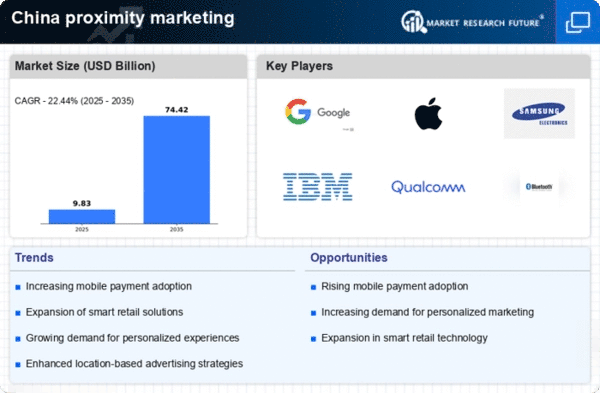Evolving Retail Landscape
The transformation of the retail landscape in China is a crucial driver for the proximity marketing market. Traditional retail models are increasingly being supplemented by e-commerce and omnichannel strategies, prompting retailers to adopt innovative marketing techniques. The proximity marketing market is likely to thrive as retailers seek to bridge the gap between online and offline shopping experiences. For instance, the integration of beacon technology in physical stores allows retailers to send targeted promotions to customers' smartphones as they enter the store. This approach not only enhances customer engagement but also drives foot traffic and sales. As the retail sector continues to evolve, the proximity marketing market may witness a growing emphasis on personalized marketing strategies that cater to consumers' preferences.
Rising Smartphone Penetration
The increasing penetration of smartphones in China is a pivotal driver for the proximity marketing market. As of 2025, approximately 1.2 billion mobile subscriptions exist in the country, with smartphone users accounting for over 80% of this figure. This widespread adoption facilitates the use of location-based services, enabling businesses to engage consumers through targeted marketing strategies. The proximity marketing market benefits from this trend, as businesses leverage mobile technology to deliver personalized offers and promotions based on users' real-time locations. Furthermore, the integration of mobile payment systems enhances the effectiveness of proximity marketing campaigns, allowing for seamless transactions and improved customer experiences. As smartphone technology continues to evolve, the potential for innovative marketing solutions within the proximity marketing market appears promising.
Government Support for Digital Economy
The Chinese government's commitment to fostering a digital economy significantly influences the proximity marketing market. Initiatives aimed at enhancing digital infrastructure and promoting technological innovation create a conducive environment for proximity marketing strategies. The government has allocated substantial funding, estimated at over $100 billion, to support the development of smart technologies and digital services. This investment is likely to bolster the proximity marketing market, as businesses gain access to advanced tools and platforms for engaging consumers. Furthermore, regulatory frameworks that encourage data sharing and collaboration among industries may enhance the effectiveness of proximity marketing campaigns. As the government continues to prioritize digital transformation, the proximity marketing market stands to benefit from increased investment and innovation.
Urbanization and Consumer Behavior Changes
China's rapid urbanization is reshaping consumer behavior, which in turn drives the proximity marketing market. With over 60% of the population now residing in urban areas, consumers are increasingly seeking convenience and personalized experiences. This demographic shift encourages businesses to adopt proximity marketing strategies that cater to urban dwellers' preferences. The proximity marketing market is likely to see a surge in demand for location-based promotions, as urban consumers are more inclined to respond to offers that are relevant to their immediate surroundings. Additionally, the rise of smart cities in China, characterized by advanced infrastructure and technology, further supports the growth of proximity marketing initiatives. As urbanization continues, the proximity marketing market may witness innovative approaches to engage consumers effectively.
Technological Advancements in Marketing Tools
Technological advancements play a vital role in shaping the proximity marketing market. The emergence of sophisticated marketing tools, such as geofencing and Bluetooth beacons, enables businesses to implement highly targeted marketing campaigns. In 2025, the market for location-based marketing technologies is projected to reach $10 billion in China, reflecting the increasing reliance on technology for consumer engagement. The proximity marketing market benefits from these innovations, as they allow for real-time data collection and analysis, enhancing the effectiveness of marketing strategies. Moreover, advancements in artificial intelligence and machine learning are likely to further refine targeting capabilities, enabling businesses to deliver personalized content to consumers based on their behaviors and preferences. As technology continues to advance, the proximity marketing market appears poised for substantial growth.
















